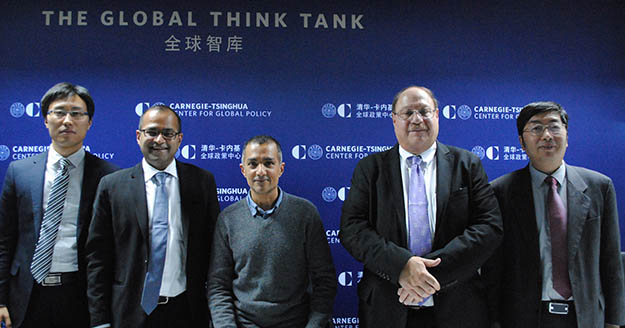Registration
You will receive an email confirming your registration.
In recent decades, India has developed space and counter-space capabilities, including anti-satellite technologies, which will have important implications for security and stability in South Asia and beyond. India’s growing capacities and how countries, such as Pakistan, respond to them could impact the subcontinent’s existing nuclear and military balance. China has raised concerns that U.S.-India cooperation on missile defense and other strategic defense programs may cause new challenges for India-China and U.S.-China security relations.
Carnegie–Tsinghua’s Tong Zhao moderated a discussion with South Asia security experts Bharath Gopalaswamy and Gaurav Kampani, who shared their insights on India’s space weapons and the broader security implications at play.
This event was off the record.
Discussion Highlights
- The Future of Space Norms: Participants explained that next year carries significant symbolic importance for space governance—marking the 60th anniversary of the launch of the Sputnik satellite, the 50th anniversary of the Outer Space Treaty that formed the basis of international space law, and the 45th anniversary of the now-defunct Anti-Ballistic Missile Treaty between the United States and the Soviet Union. Given the increasing number of states pursuing activities in space, the proliferation of space weapons, and the lack of existing rules and norms governing outer space, panelists asserted that it is more important than ever to revisit the rules and norms governing outer space.
- India’s Regional Security Concerns: Panelists noted the ongoing debate within the Indian security community on utilizing space assets to enhance its regional security. Space assets will likely play a role in bolstering India’s maritime domain awareness, one panelist said, explaining that Indian officials hope to depend less on international partners in the future and are working to develop greater domestic capacity for space situational awareness to protect the country’s roughly thirty space assets.
- Ballistic Missile Defense: India’s ballistic missile defense program is oriented toward Pakistan, the world’s fastest growing nuclear power and India’s historic rival. Discussants maintained that the program is driven by two concerns: a potential conventional conflict with Pakistan that could involve nuclear weapons, and the potential for non-state actors in Pakistan to acquire access to the nuclear weapons and corresponding launch systems. Within this context, a discussant argued that India’s anti-ballistic missile systems are oriented toward defense against short- and medium-range missiles. However, another panelist suggested that the credibility of these systems can be called into question given the limited number of tests performed thus far.
- Regional Contingencies: Ballistic missile defense systems have historically been considered highly destabilizing due to their potential to undermine deterrence, one discussant said. However, another panelist noted that some voices within the Indian strategic community have contended that countries which have instituted a no-first-use doctrine could benefit from missile defense systems without the risk of destabilizing other nations. Other panelists argued that India’s pursuit of a robust ballistic missile defense program could exacerbate paranoia in Pakistan, potentially leading to greater regional instability, and generate concern from China’s strategic community.
- Potential for China-India Dialogue: Discussants argued that India has not established a clear rationale for creating a ballistic missile defense program against China because both countries maintain no-first-use policies and pursue minimum deterrence. Panelists went further, saying that both countries share similar security cultures and pursue similar incentives in the space sector. These similarities, panelists suggested, could create an area for agreement between India and China on the parameters of India’s ballistic missile defense program that could yield real benefits in developing a mutual understanding of India’s activities, in terms of both missile defense and in outer space.
Tong Zhao
Tong Zhao is an associate in Carnegie’s Nuclear Policy Program based at the Carnegie–Tsinghua Center for Global Policy.
Bharath Gopalaswamy
Bharath Gopalaswamy is the director of the South Asia Center at the Atlantic Council.
Gaurav Kampani
Gaurav Kampani is a nonresident fellow at the South Asia Center at the Atlantic Council.
Robert A. Manning
Robert A. Manning is a senior fellow with the Brent Scowcroft Center on International Security at the Atlantic Council.
Li Bin
Li Bin is a senior associate working jointly in the Nuclear Policy Program and Asia Program at the Carnegie–Tsinghua Center for Global Policy and a professor of Tsinghua University.
